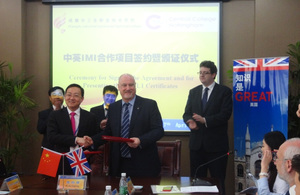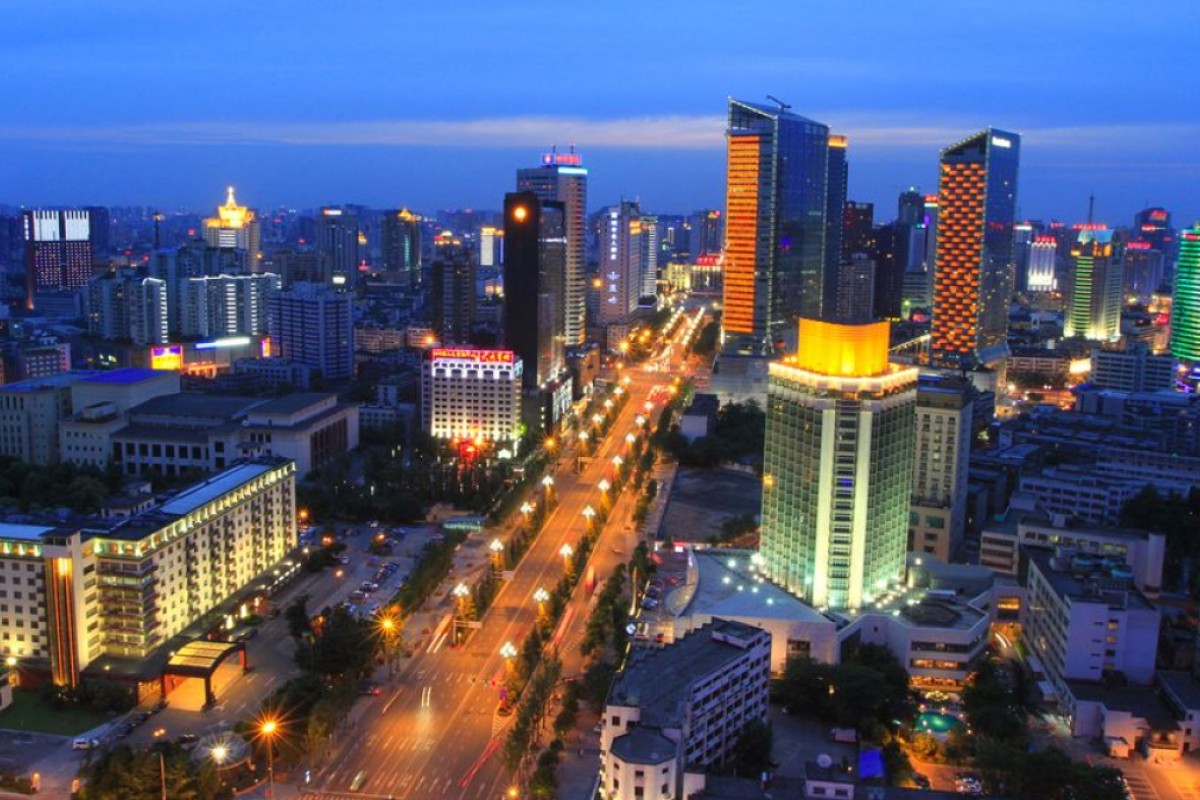China (Sichuan) Pilot Free Trade Zone was officially established, covering cities of Chengdu and Luzhou in the province on April 1, 2017.
Taking up a total area of 119.99 square kilometers, it consists of Tianfu New Area and Chengdu Qingbaijiang Railway Port Area in Chengdu, and South Sichuan Port Area in Luzhou.
Chengdu Area of China (Sichuan) Pilot Free Trade Zone (Chengdu Pilot Free Trade Zone) covers a total area of 100 sq km and consists of two areas, Tianfu New Area (90.32 sq km) and Chengdu Qingbaijiang Railway Port Area(9.68 sq km).
In 2017, the free trade zone saw 22,000 new tenant companies with a registered capital amount of 310 billion yuan, among which, 204 were foreign-invested, accounting for one third of the province's total.
In that year, the two cities made a 49.1-percent growth in foreign trade.
By the end of March 2018, the free trade zone had attracted 34,000 new companies with registered capital exceeding 400 billion yuan with investments from more than 300 foreign companies.
In January and February 2018, the foreign trade of the two cities grew by 25.5 percent.
Tianfu New Area
It is the core functional zone of modern services, high-end manufacturing, high-tech Industries, air-transportation related economy and port services, which will be built into a national clustered high-end industrial zone, innovation driven development leading area, open financial reform and innovation center, business logistics center and international aviation hub. In accomplishing the core task, Tianfu New Area works to be leading areas of opening-up in the inland regions.
Chengdu Qingbaijiang Railway Port Area
It will prioritize developing port services, such as international commodity distribution, de-consolidation exhibition, bonded logistics, vehicle import, financial services, etc. and modern services, such as information services, technology services, exhibition services, aims to be built into a strategic fulcrum of international trade corridor which connects the inland with the Belt and Road Area.
It will prioritize developing port services, such as international commodity distribution, de-consolidation exhibition, bonded logistics, vehicle import, financial services, etc. and modern services, such as information services, technology services, exhibition services, aims to be built into a strategic fulcrum of international trade corridor which connects the inland with the Belt and Road Area.
South Sichuan Port Area
Covering a planned area of 19.99 square kilometers, the South Sichuan Port Area is aimed at constructing the shipping and logistics center in upper reaches of Yanzi River that radiates the whole Sichuan, Yunnan and Guizhou, and the demonstration plot of transition and collaborative development of river-coast industries. It focuses not only on the development of modern services like shipping, logistics, port trade, medical care and education but also on advanced manufacturing industries and characteristic industries with local advantages like equipment manufacturing, modern medicine and food & beverage. The 6 major test zone to be established are the International Shipping Development Cooperation Zone, the Port Process Trade Transition and Upgrading Service Zone, the Modern Services Development Test Zone, the International Wine Development Cooperation Zone, the Riverside High-tech Industries Gathering Area and the Second Aviation Industry Hub.
Advantage
Sichuan FTZ has three noteworthy advantages.
First, Sichuan FTZ has an economic advantage. Sichuan’s economic aggregate, market scale, infrastructure, business environment and demographic dividend provide an excellent economic environment for investment, and its market potential and future industrial driving force also have considerable strength.
Local superiority is the second advantage of Sichuan FTZ. Chengdu, Sichuan’s capital is a "Western gateway city and open highland", with the third largest number of consulates general, and plays an indispensable role in effective international exchanges.
The third advantageous aspect of Sichuan FTZ is innovation. Sichuan has many famous universities, such as Sichuan University, Southwest Jiaotong University and the University of Electronic Science and Technology, providing enormous numbers of well-educated talents for industrial innovation, and it also adopts encouragement policies for self-employment. Chengdu was praised by Fortune magazine as one of the "Top Ten Start-up Cities in China" last year.
To facilitate people who want to invest and set up business in China (Sichuan) Pilot Free Trade Zone, here is an introduction of Types of business presence in China:
Before starting up a business in China, you have to know what are the options. Foreign Investors generally establish a business presence in China in one of five modes: Wholly Foreign Owned Enterprise(WFOE); Representative Office; Foreign Invested Partnership Enterprises (FIPE); Joint Venture and Hong Kong Holding Company.
Wholly Foreign OwnedEnterprise (WFOE) is a Limited liability company wholly owned by the foreign investor. WFOE requires no registered capital and it's liability of equity , can generate income, pay tax in China and it's profit could be repatriate back to investor's home country. Any enterprise in China which is 100 percent owned by a foreign company or companies can be called as WFOE.
Representative Office (RO) is aLiaison Office of it's parent company. It requires no registered capital. It's activities would be: product or service promotion, market research of it's parent company's business, Quality Control liaison office etc in China. RO generally is prohibited to generate any revenue nor generating contracts with local businesses in China.
Joint Venture (JV) is a Limitedliability company formed between Chinese investor and Foreign investor. The parties agree to create a entity by both contributing equity, and they then share in the revenues, expenses, and control of the enterprise. JV usually been used by foreign investor to engage the so called restricted in areas such like: Education, Mining, Hospital etc.
Since March 1, 2010: Measures ofEstablishment of Foreign Invested Partnership Enterprises (FIPE) in Chinaistaking effect. The regulation, which take effect since March 1, 2010, are known as the Administrative Measures for the Establishment of Partnership Enterprise in China by Foreign Enterprises or Individuals. There's no required minimum registered capital for a Foreign Invested Partnership Enterprise (FIPE) in Shanghai, Beijing, Guangzhou, Shenzhen, Hangzhou and rest cities of China
Hong Kong Company usually been used as a Special Purpose vehicle (SPV) to invest Mainland China. Hong Kong is one of the quickest locations to Incorporate a business. Although a HK company is not a legal entity in Mainland China (Mainland China and Hong Kong, See Wiki 1 country, 2 systems), lots foreign investors, especially investors from Europe and North America still chose to setting up a Hong Kong company as SPV to invest China.
After China's entry to WTO, most industries in China welcome foreign investment, WFOE setting up in Chinabecomes the first option of foreign investment's entity structures instead of Rep. Office setting up in China. At the mean time, for tax purpose, effective licensing system etc more and more investors use Hong Kong as the holding company to invest China mainland, using this offshore company to hold their operations in China.
Business set-up in China (Sichuan) Pilot Free Trade Zone is a big project by itself, which requires financial and time commitments, business management knowledge and China expertise. Identifying a competent agent to manage the complex process will be a cost and time effective way to avoid potential pitfalls . Tommy China Business Consulting has direct connections in the local government
Since 2006, TCBC has been focusing on consulting services for our clients to invest in Chengdu China. We are specialized in establishment of wholly foreign owned enterprises (WFOEs), setting up of offshore companies, trading services, tax minimization, Assist in obtaining government approvals and certificates for running business, negotiate and draft various legal documents provide legal advice, negotiate government officer for Land acquisition. Advising on formation of WOFE and business structures, managing and controlling WOFE in China (Sichuan) Pilot Free Trade Zone, drafting privacy policies and structuring commercial transactions
TCBC will manage all aspects of incorporation to get you a business license in China (Sichuan) Pilot Free Trade Zone. We offer a range of company formation services including helping you to set up:
-Wholly Foreign Owned Enterprises (WFOE )
-Joint Ventures (Equity/Co-operative)
-Foreign Invested Partnership Enterprises (FIPE)
Contact Tom Lee for business setup consulting in China (Sichuan) Pilot Free Trade Zone now.

